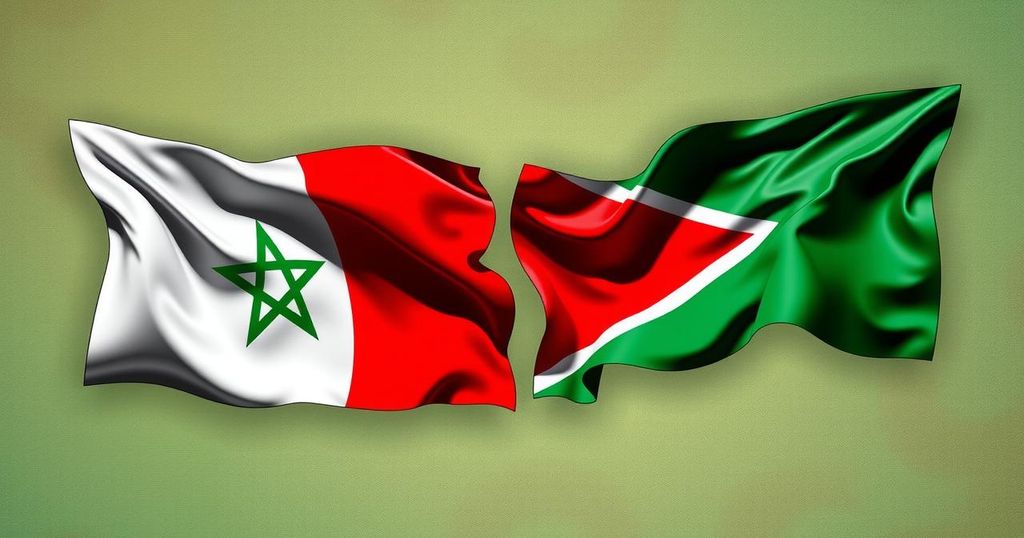The relationship between Morocco and Mauritania has evolved into a crucial strategic partnership, especially amidst the Moroccan Western Sahara conflict. Their cooperation spans economic, cultural, and security domains, underpinned by recent diplomatic improvements. Both countries are focused on addressing shared regional challenges while leveraging significant economic opportunities, fostering stability and integration within North Africa.
The relationship between Morocco and Mauritania has evolved significantly, particularly since the onset of the Moroccan Western Sahara conflict. Mauritania’s geographical positioning as a border nation between Algeria and Morocco allows it to serve as a vital player in the Maghreb region, facilitating various resolution efforts. This dynamic is influenced by the complex interplay of Mauritania’s political, economic, and security interests shaped by external pressures, most notably from Algeria. Experts in North African studies have noted a diplomatic thaw, marked by recent meetings, including an unofficial visit from Mauritanian President Mohamed Ould Ghazouani to King Mohammed VI of Morocco.
The foundation of Moroccan-Mauritanian relations is steeped in history and reflects a shared commitment to regional integration. The partnership spans multiple domains, including cultural, economic, and security aspects, highlighting common challenges such as terrorism, organized crime, and illegal migration. The strategic location of Mauritania enhances its role in addressing these threats, particularly given its geographical proximity to key conflict zones.
The interests of both countries align closely, particularly concerning the Guerguerat crossing, which plays a pivotal role in trade between them. Mauritania adopts a stance of neutrality in the Western Sahara dispute while engaging in initiatives to promote regional economic opportunities, such as its participation in a gas pipeline project from Nigeria to Europe. This cooperation lays foundational groundwork for continued diplomatic and economic ties between Morocco and Mauritania despite the complexities of their geopolitical landscapes.
Morocco’s developments in its southern provinces aim not only to bolster its economic strategy but also to create a vital corridor between Africa and Europe. Projects such as the Atlantic maritime port of Dakhla are critical in enhancing trade connectivity and attracting foreign investment. For Mauritania, these initiatives offer avenues for deeper economic integration and regional collaboration, establishing a substantial geopolitical framework conducive to stability.
The cooperation between Morocco and Mauritania encompasses more than merely economic benefits; it extends into the realm of security and stability. Both countries face similar challenges and can benefit from joint efforts aimed at addressing both traditional and non-traditional threats. Enhanced military and naval collaboration aims to create a robust regional security framework, ultimately enabling both nations to better manage emerging crises.
Underpinning these efforts is a strategic partnership that could serve as a model for broader regional cooperation throughout Africa. Initiatives such as the Atlantic Gas Pipeline and various economic programs demonstrate the comprehensive potential of Moroccan-Mauritanian relations. However, for this strategic partnership to become a successful reality, it must be grounded in a flexible, open-minded political framework that prioritizes sustainable economic collaboration.
In summary, while Morocco and Mauritania share deep historical and cultural ties, their diplomatic relationship necessitates an adaptable political context and a solid economic strategy. A shared vision focusing on mutual development through significant regional projects can reshape not only their bilateral relationship but also the overarching geopolitical landscape of North Africa, paving the way for a more integrated and prosperous continent.
The strategic relations between Morocco and Mauritania have gained importance in light of regional conflicts, particularly the Moroccan Western Sahara dispute. Mauritania’s unique position as a connector between the north and south of the Maghreb region allows it to influence key diplomatic and economic interactions. Observations by North African studies experts indicate a warming relationship marked by high-level meetings intended to bolster cooperation against shared security challenges while fostering regional stability and economic growth.
The relationship between Morocco and Mauritania is a promising paradigm for regional cooperation, emphasizing the importance of aligning strategic interests with shared economic development. Enhanced bilateral ties grounded in a flexible political framework are crucial to addressing broader regional challenges. Leveraging joint initiatives in security and sustainability could significantly enhance both nations’ roles in creating a stable and prosperous African continent.
Original Source: moderndiplomacy.eu






